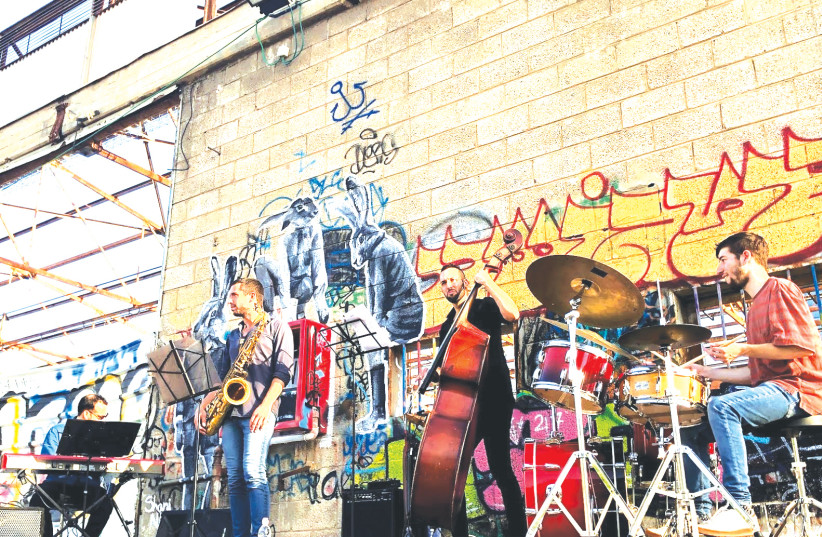We are all Polish, right? No, that’s not a DNA-proven finding, but, rather, a tongue-in-cheek philosophical take on how we Jews have a tendency to moan and groan about the adversities of life, real or imagined.
But Polish culture has plenty of positive vibes to offer, too, not least in the music department. We’ve all heard of Frederic Chopin, but Poland has produced A-lister composers for centuries, from 13th-century composer Wincenty of Kielcza, who wrote the score to anthemic hymn “Gaude Mater Polonia,” through to the Baroque creations of Jacek Rózycki and on to the envelope-pushing multidisciplinary sensibilities of the likes of 40-year-old Jagoda Szmytka.
It has also produced its fair share of skilled jazz artists, with several exponents thereof due to appear at the third annual Polish Jazz Festival, which takes place this week at the Gray Club in Tel Aviv (September 13-15), under the artistic directorship of Barak Weiss. The likes of seasoned Polish pianist Marcin Wasilewski and promising young compatriot saxophonist Marta Wajdzik, both of whom are in the three-day lineup, have pretty hefty shoulders to stand on as they ply their own course through the intricacies of improvised music.
The birth of Polish Jazz: Jewish musician Eddie Rosner
The forefather of the entire Polish jazz scene is said to be a Jewish chap called Eddie Rosner. He was born in Berlin, to Polish parents, and started out on classical violin. But by the time he was 18, he had developed an interest in jazz trumpet. His second place to the great Louis Armstrong in a trumpet competition in New York, just one year later, is testament to the rapid progress he made.
Rosner went on to make a splash on the international jazz scene, but, by the mid-1930s, was forced to flee Nazi Germany to Poland, and thereafter to the USSR. He enjoyed a high profile and highly remunerative career there for a while, until he fell out of favor with Stalin and ended up in a gulag.
Moving swiftly along the Polish jazz timeline, shifting into modernism, renowned pianist-composer Krzysztof Komeda led his own groups in the 1960s, and also gained global note for his movie soundtrack work. Nearer our own time, there is trumpeter Tomasz Stanko, who was a leading light on the avant-garde scene for over half a century, and the likes of 46-year-old Wasilewski, who makes a return visit to these shores, with his trio, to play two sets on the opening evening of the festival – a tribute to Stanko followed by a program of his own charts.
We will also get a glimpse of what the next generation of Polish jazzers are getting up to these days, when 21-year-old Wajdzik takes the Gray Club stage, with her quartet, on Wednesday.
WAJDZIK SAYS she has been surrounded by sonorous sounds ever since she can remember.
“Music appeared in my life quite naturally,” she recalls. “My parents are music teachers, so when I was young there was always somebody playing a musical instrument at home. That is why it was kind of a natural process to get into music.”
She says she was initially inspired by one of the current American jazz greats, by way of a rock-pop icon. “My parents used to listen to a lot of Sting’s music, which I loved as well, especially because of Branford Marsalis’s solos. He was one of the reasons why I started playing the saxophone at the age of eight.”
She got more encouragement from home. “My brother Mark, a trumpeter, was the first in my family who got into jazz. When I was 11 he encouraged me to practice jazz with him. It was such a valuable time. We were listening to music together, talking about music and then playing together in a band!”
Before she began improvising on saxophone and, later, flute, Wajdzik got herself a grounding on an instrument that allowed her to probe different lines of multilayered melodic exploration, as well as gaining a solid foundation in the syntax and grammar of the craft. “I started playing the piano when I was six. I think it is crucial to play the piano to understand music theory and harmony. It is also helpful in improvisation because, while playing a monophonic instrument, you can try to think like a pianist to develop your music language or to understand the voice-leading better. For me, piano is also a basic device to compose.
“When it comes to flute, I treat it more like an additional sound in my music than another instrument I regularly play.”
The youngster duly moved away from classical material into more unfettered musical domains. She says has wanted to improvise since the get-go. “It has always been something appealing for me, to create music in real time and to share my emotions and experiences with people by playing music.”
“It has always been something appealing for me, to create music in real time and to share my emotions and experiences with people by playing music.”
Marta Wajdzik
In addition to the aforementioned Marsalis, Wajdzik says she feeds off a wide range of influential jazz figures, such as American reedmen Ravi Coltrane, Chris Potter and the late Michael Brecker, 40-year-old trumpeter Ambrose Akinmusire, celebrated pianist Brad Mehldau and noted Israeli guitarist Gilad Hekselman. There are also a bunch of countrymen in there, too, some of whom will be on the Tel Aviv bandstand on Wednesday.
“There is a huge amount of great musicians from Poland,” she states. “I have the honor and pleasure to play with three of them in my quartet!”
The instrumental threesome backing Wajdzik at the festival includes Pawel Tomaszewski on keyboards and programming, bassist Robert Kubiszyn and drummer Pawel Dobrowolski, with the band leader adding some programming sonic manipulation herself.
Wajdzik clearly has a mature head on her young shoulders, and her festival slot will feature self-penned material from her debut album, My Planet, which she released at the tender age of 18, as well as “a couple of new pieces.”
The youngster says she is “so excited” about making her first trip over here, and is looking forward to getting a sense of this little Middle Eastern country that continues to produce quality jazz artists.
“There is a really strong jazz scene in Israel!” she enthuses. “So many fantastic musicians come from there, like Gilad Hekselman, Ziv Ravitz, Avishai Cohen, Shai Maestro. It seems that Israel is a huge source of outstanding music!”
There’s no arguing with that.
In addition to the Polish guests, the Polish Jazz Festival roster features such local leading lights as pianist Uriel Herman and saxophonist Amit Freedman, the latter performing a tribute to late Jewish Polish-American composer Bronislaw Kaper.
For tickets and more information: https://bit.ly/polishjazz22













